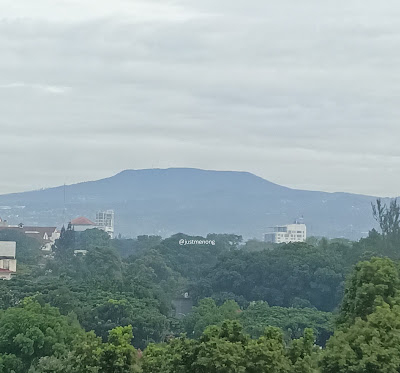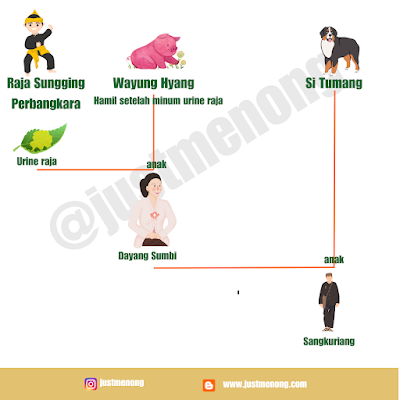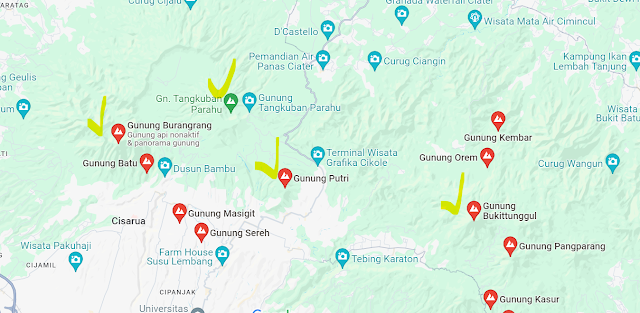The Sangkuriang story is certainly very well known to Indonesian children who like the
legend of the archipelago. The more we grow up, the more we will observe
the storyline that becomes impressed as ‘weird and absurd’ in most of the
stories that are spoken downhill.
Sangkuriang and Dayang Sumbi
Based
on historical records, Sangkuriang's story is spoken orally and refers to
the manuscript of Bujangga Manik written on the lontar leaves from the
early 16th century AD. Summarized from Wikipedia, this story originated
from a goddess who was cursed into a piggy bank and named Wayungyang. In
addition to Wayungyang, a god was also cursed to become a dog and named
Si Tumang.
Once
upon a time, a king named King Sungging Perbangara hunted in the
forest and urinated heavily on a leaf. Accidentally, Wayung, who drank
this king's urine, resulted in a pregnant Wayung and gave birth to a
beautiful baby named Dayang Sumbi, who would be found by the king's
bodyguard.
Dayang
Sumbi grew up to be a beautiful girl and lived with the king. Dayang
Sumbi is much liked by men, but none of them captured her heart. As
an adult, you often isolate yourself on a hill. In her daily life, Dayang
Sumbi fills the time by weaving fabric. One day, the loom he
was holding fell. Because it is lazy to take it, Dayang Sumbi said if
someone took his loom, Dayang Sumbi promised to make him a sister if she
was a woman, and if she was a man, Dayang Sumbi promised to make her a
husband.
Unexpectedly,
the Tumang passed by and took the loom that the Yaws dropped by the
Sambi Dayang. By forcing Dayang Sumbi to marry Si Tumang and have a
child called Sangkuriang. Sangkuriang grew up with Si Tumang without
knowing that the dog was his own father.
Once
upon a time, Dayang Sumbi ordered Sangkuriang to hunt deer in the
forest. Because he did not get his game, when Sangkuriang saw a PLAN
(which was none other than Wayungyang), Sangkuriang told the Tumang to
hunt the piggy bank instead. Of course, the Tumang refused. In anger, Sangkuriang shot Si Tumang and gave his heart to Dayang Sumbi.
When
Dayang Sumbi found out that the heart that Sangkuriang gave was
actually the heart of Si Tumang, Dayang Sumbi was angry and hit
Sangkuriang's head with a stick (ricesp) to cause scars. The angry
Sangkuriang decided to go far and wander.
Dayang
Sumbi himself regretted his actions and prayed that one day he would be
reunited with his son. The prayer was answered so that Dayang Sumbi did
not age with her eternal beauty.
Long
story short, Sangkuriang matured, met a beautiful woman and fell in
love with her. One time, the beautiful woman saw a scar on Sangkuriang’s
head and asked what the scar was. When you hear the story of Sangkuriang,. The woman realized the man who expressed love was none
other than her son. Yes, that beautiful woman is Dayang Sumbi. Dayang
Sumbi refused, but Sangkuriang still insisted on marrying Dayang Sumbi.
To
prevent it, Dayang Sumbi gives an unreasonable condition, which is to
stem the Citarum River and make a boat in just one night. When the boat
is finished in time, then Dayang Sumbi is willing to accept Sangkuriang's
love.
Undaunted,
with his strength, Sangkuriang asked for the help of the genie to speed
up the boat. Dayang Sumbi also prayed incessantly so that the
construction of the boat failed. The prayer was answered because the
morning came early when the boat had not been completed. As soon as he
saw the dawn coming, Sangkuriang was unable to hold back the anger and
kicked the boat, falling face down.
Sangkuriang's story
Now,
we will be astonished by the storyline that does not make sense. The
study of the origin of folklore has been widely discussed, even in
research journals. Folklore is usually associated with natural events
or social phenomena. Like the story of the prohibition forest in Kampung Naga.
Folklore
itself is often present in various versions included in the Sangkuriang
story. Although the outline does not change, there are some
different details for each version.
Meaning Geologically Tatar
Reporting from the Padjadjaran University website, Tangkuban Perahu mountain geologically
formed from the fragments of Mount Sunda that erupted 200,000 years
ago. Mount Tangkuban Perahu itself is formed from lava that emerged
from the base of the caldera post-Sunda eruption, forming a large basin
that is now the city of Bandung.
The
lava slowly forms a new volcano that also occurs in an eruption so that
the peak is cut off and becomes flat, with two mountain craters located
side by side to the west and east that resemble an upturned boat.
In
the story of Sangkuriang, when going to make a boat, Sangkuriang cut
down the tree and left the roots of the tree or wooden stump, which then
became Mount Bukittunggul, while the rest of the twig turned into Mount Burangrang.
Dayang Sumbi himself fled to a mountain and turned into a flower. The mountain was once known as Mount Putri. Sangkuriang itself disappeared in a place that is now known as Ujungberung (the name of the area in the city of Bandung).
Philosophical Meaning
What is the meaning behind this Sangkuriang story?
A
journal discusses the story of Sangkuriang, which mentions the kinship
between King Sungging Perbangkara and Dayang Sumbi (father and son),
describing satire or social criticism of the habits of the nobility who
seek love in the interior of the royal territory, symbolized by urinating
carelessly.
Wayungyang (lime, mother of Dayang Sumbi) is a commoner who lives in the forest as a symbol of low-class society.
Every
naming of characters in the Sangkuriang story also has a certain
meaning, like a puppet that means a feeling of incoherence that means
someone who is still in animal nature but began to worry about wanting
to become a whole human being.
The
interpretation of the philosophy of the Sangkuraiang story is
translated in various versions. One review of a Twitter account states the Sangkuriang story is a past expression of people to
criticize the government. Metaphors are used to describe the shackled
conditions of freedom of expression. Piggy banks that have children
because they drink the king's urine become a symbol of strata
differences in society in the past.
Whatever
the difference in meaning, the myth in the story of Sangkuriang is the
way of man in the past to narrate human behavior (virtue, knowledge,
evil, and others) in the experience of human life into a guide and moral
lesson for a society to respect nature.







Post a Comment
Post a Comment